Several eCommerce platforms are introduced to the market each year, but giants like BigCommerce vs Shopify still stand firm! Since both platforms have their own strengths and weaknesses, it's daunting to find out which is the best option for your business.
Deeply aware of that, I've diligently researched and issued this BigCommerce Shopify comparison. Here are some of the key takeaways:
- Is Shopify better than BigCommerce? It is. Shopify wins in ease of use, themes & designs, apps & add-ons, and dropshipping functionality.
- Is BigCommerce better than Shopify? Shopify still wins, though BigCommerce outshines it in built-in sales & marketing features and payment gateways.
- Shopify and BigCommerce are tied in pricing systems, security, and support.
For more information, keep reading. A detailed comparison between Shopify vs BigCommerce is just a few scrolls away!
BigCommerce vs Shopify: A Quick Takeaway
From an unbiased point of view, both BigCommerce vs Shopify are amazing in their own right. Nonetheless, there are differences that make either platform better suited for specific types of users!
Hence, to make sure our evaluation is just, my colleague and I did a test to compare BigCommerce and Shopify ourselves and have our own conclusion for both platforms. We built an online store selling T-shirts around six months ago, and Shopify vs BigCommerce were the two biggest names at that time. After doing some research, we can say Shopify is the top-rated winner, though BigCommerce also stands its own ground very well.
Features |  |  | Winner |
Applies transaction fees depending on the plan. | Offers lower additional costs with no transaction fees in all plans. | BigCommerce | |
Comes with a user-friendly editor and setup wizard. | Requires more technical skills for advanced features. | Shopify | |
Has a wider selection of modern and customizable themes. | Provides limited themes compared to Shopify. | Shopify | |
Grows your business with a larger app ecosystem. | Has more built-in features reducing the need for apps and offers unlimited API calls in Enterprise plan. | Shopify | |
Develops in-house Shopify Payments with no transaction fees. | Gives flexibility in payment providers with no fees. | BigCommerce | |
Supports dropshipping through apps like Oberlo and supplier relationships. | Allows the dropshipping model through third-party integrations. | Shopify | |
Needs third-party app additions for full-featured sales abilities. | Offers more natively integrated features across sales channels and POS systems. | BigCommerce | |
Demands some app additions for full SEO capabilities. | Provides readily accessible marketing tools, especially excellent SEO features. | BigCommerce | |
Provides store protection and validation for safe online payments. | Satisfies compliance standards and layer protections for user data protection and privacy. | A draw | |
Give better customer support, with the extra addition of social media support. | Can improve support organization and clarity. | Shopify |
1. Pricing & cost – BigCommerce wins
From our research, both Shopify vs BigCommerce pricing plans offer free trials. They also have price plans ranging from around $19 to $299.
However, the difference between BigCommerce vs Shopify pricing relies more on the types of features available to each plan. For example, while Shopify offers the abandoned cart recovery feature in the Basic Plan, BigCommerce would only unlock this feature in the Plus Plan.
BigCommerce eCommerce pricing
As of the writing, there are 4 BigCommerce pricing plans as follows:
- Standard: $29/month.
- Plus: $79/month.
- Pro: $299/month.
- Enterprise: custom pricing depending on requirements.
What surprised me is that BigCommerce charges no transaction fee on every plan. This means businesses can get the most of their sales without worrying about additional costs or penalties.
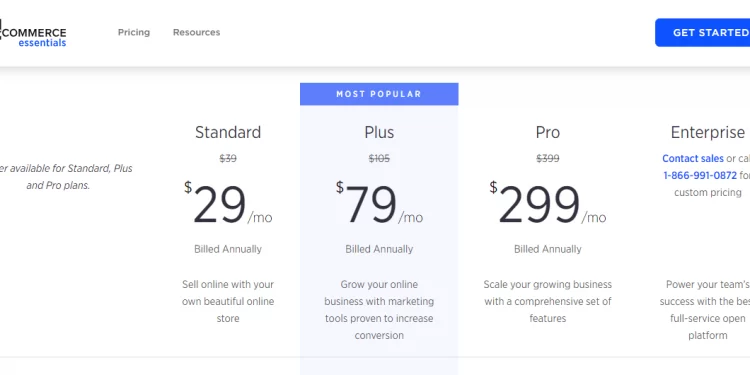
Shopify eCommerce pricing
Likewise, Shopify also offers 4 pricing plans:
- Basic: $19/month.
- Shopify: $49/month.
- Advanced Shopify: $299/month.
- Shopify Plus: Starting from $2,300, varying depending on requirements.
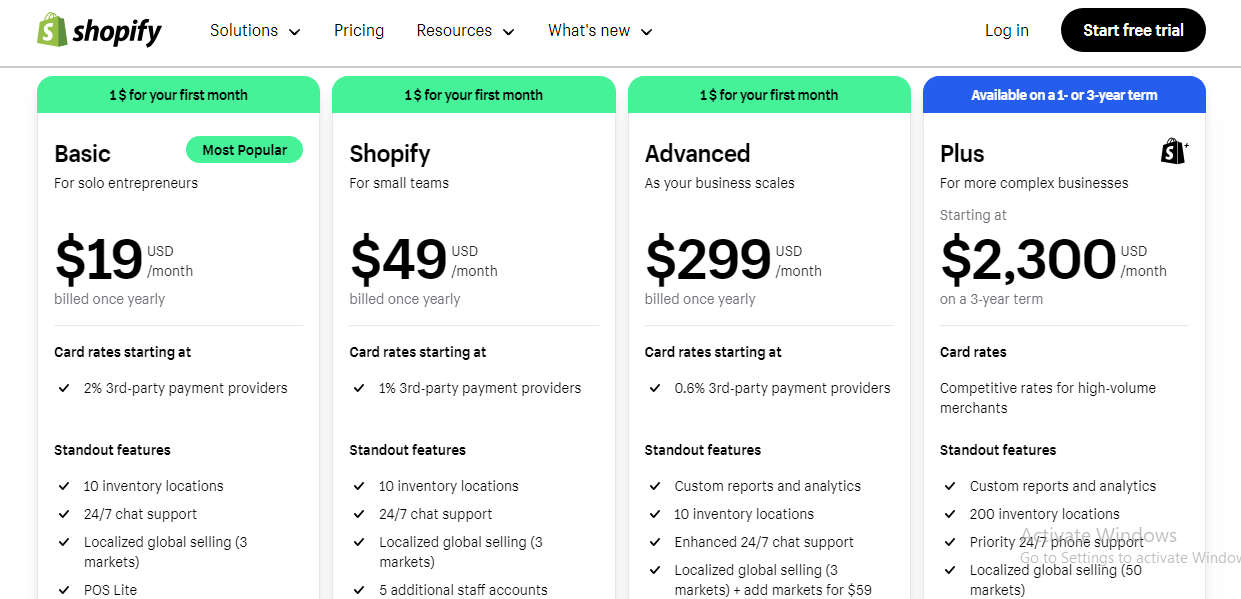
Additionally, Shopify also comes with an enterprise version called Shopify Plus. LitExtension has compiled a detailed comparison of Shopify Plus vs BigCommerce, so don't forget to check out this article for more information.
The Verdict
When it comes to BigCommerce vs Shopify price, I believe BigCommerce is the winner. There are no transaction fees, unlimited file storage, product variants, bandwidth, and staff accounts. With Shopify, there will be additional transaction fees and only 15 staff accounts with the Advanced Plan.
2. Ease of use – Shopify wins
Ease of use is important not only to beginners but also to experienced eCommerce entrepreneurs. Therefore, we strongly recommend taking it into consideration when comparing BigCommerce vs Shopify.
BigCommerce ease of use
Since its release, BigCommerce has always targeted owners with little experience setting up websites. However, it is versatile enough for experienced users and developers to modify the code in stores! Therefore, if you're down to developing from scratch or digging into codes, BigCommerce is the solution you will choose anyway.
Of course, it might take you some time to understand how the platform works and start building your store. Nevertheless, you can empower your store with out-of-the-box functions to grow your business.
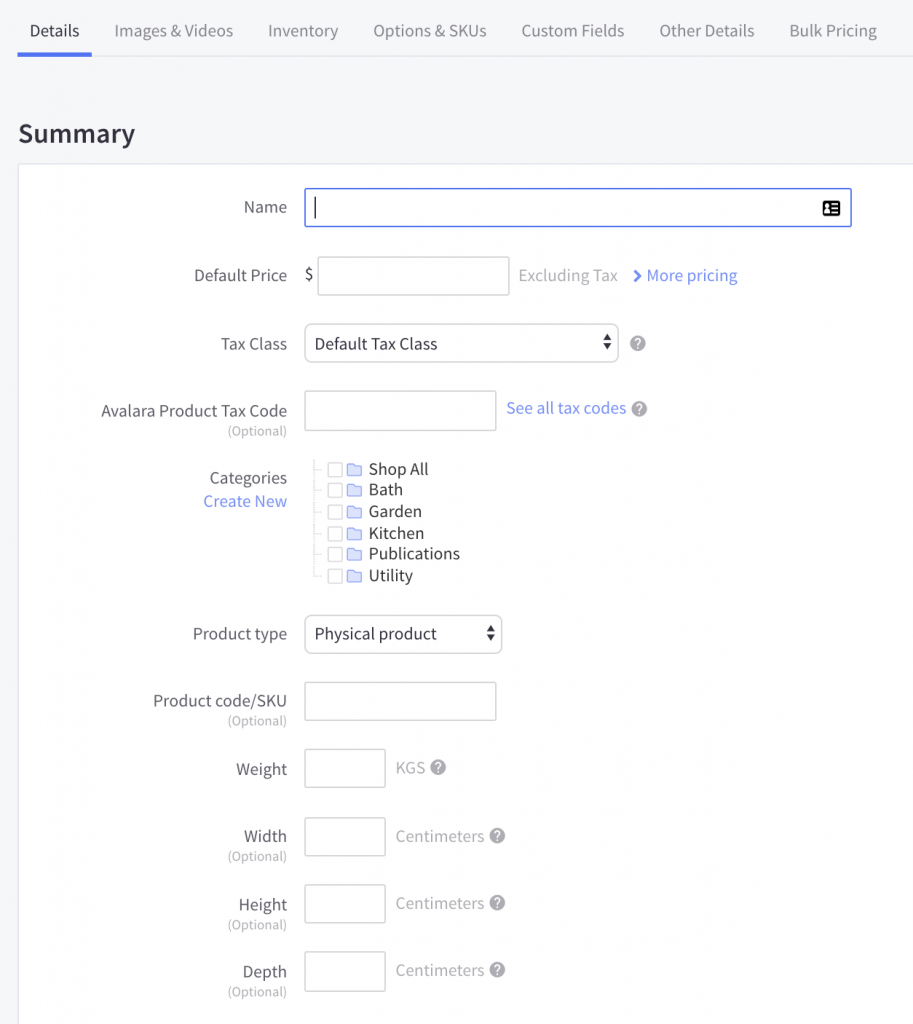
Shopify ease of use
Here's some great news: setting up a new Shopify store is very easy since Shopify's dashboard is minimal and easy to navigate! As Shopify has already built different sections for its users, you only need to follow the in-app instructions to start editing them. You don't need to get involved in the technical aspect too much and can focus on planning your business strategy.
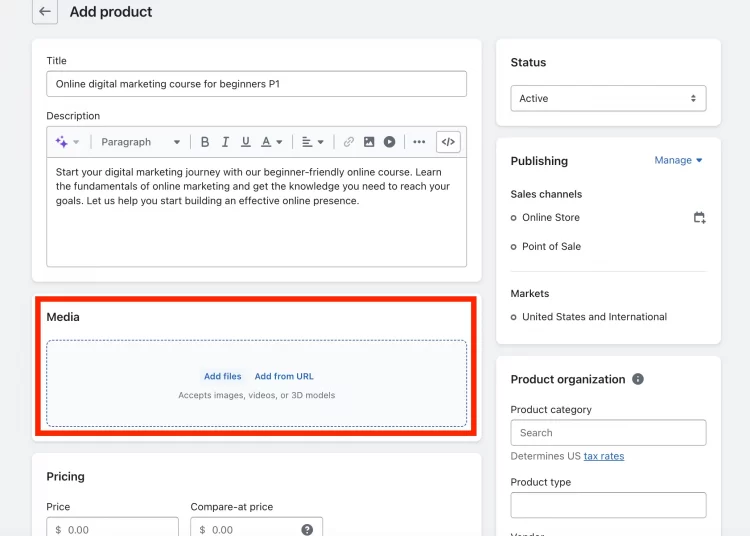
The Verdict
In all honesty, Shopify scores higher in terms of ease of use than BigCommerce. Most users praise Shopify for its onboarding process and user-friendly editor. You can access every option you need from the left-hand main menu, and there is a nice wizard instructing you to set up your store step by step.
Need Help To Migrate To Shopify?
If you are intending to migrate your store to Shopify , LitExtension offers a great migration service that helps you transfer your data from the current eCommerce platform to a new one accurately, painlessly with utmost security.3. Themes & design – Shopify wins
Of course, you also want the store to look attractive enough on the front end to entice customers to buy. Here’s what the store design options look like with BigCommerce vs Shopify.
BigCommerce themes
This eCommerce platform offers 196 different themes sorted by industry, layout, and price on the official theme store. There is a wide range of industries to choose from, although fewer than Shopify.
Plus, free BigCommerce themes are great options for beginners, or you can choose paid ones priced from $150 to $399. If you don't know where to start, take a look at the best BigCommerce themes for more inspiration.

Shopify themes
From the Shopify theme store, you can access 212 themes for different industries and styles, ranging in price from $100 to $350.
It’s easy to find your perfect theme by searching via layout, size of the store, industry, navigation style, and more. Whether we’re looking at the free vs paid options, all of Shopify’s themes are modern and professional. Better yet, Shopify’s themes allow superb levels of customization since they’re very easy to personalize.

The best part is that all of Shopify’s themes are mobile-responsive and will automatically reformat to fit the appropriate screen size. You can also edit both versions to your heart’s content so you can be sure your site looks great on all devices. Shopify even allows a mobile preview in the demo.
If you're still lost in the ocean of Shopify themes, here we've got you a list of 25+ best Shopify themes.
The Verdict
Regarding themes & designs, Shopify wins the battle against BigCommerce thanks to its various modern and mobile responsive themes. Not to mention, it offers the best deal for both free and premium options.
4. Apps & addons – Shopify wins
As an eCommerce business grows, having a flexible and customizable platform that can scale with your needs becomes increasingly important. This section examines the app marketplace and scalability options for Shopify in comparison to BigCommerce. Note that there are some applications available for both BigCommerce vs Shopify.
BigCommerce apps
When using BigCommerce, you'll benefit from 1500+ apps from different categories: Accounting & Tax, Checkout, Payment & Security, etc. Here, we provide an insightful review of top BigCommerce apps to help users figure out the most suitable apps for their businesses.
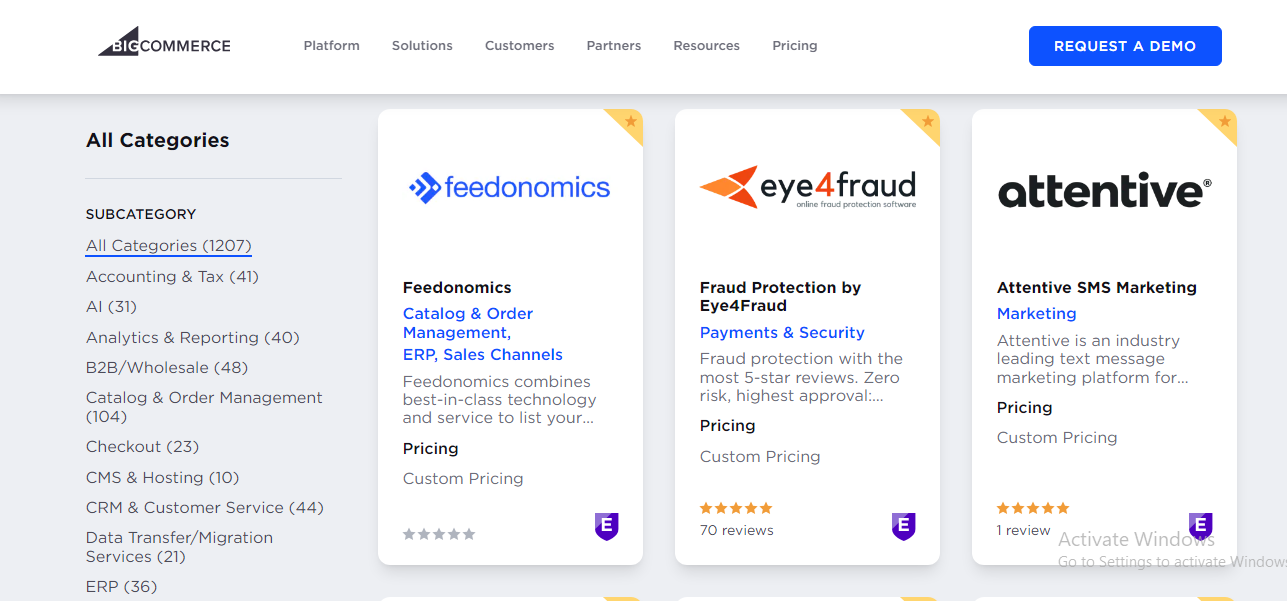
Furthermore, BigCommerce has (seriously) powerful built-in features, reducing the resources required to manage third-party apps. Though all plans offer open APIs and 99.99% uptime, its Enterprise Plan delivers a headless solution with unlimited API calls. This deal from BigCommerce definitely enables sellers and developers to outperform in eCommerce.
Most importantly, what makes BigCommerce the most scalable platform is the multi-storefront, deep integration with Google products, and custom consulting management.
Shopify apps
You will be overwhelmed by the 8,000+ apps on the Shopify official app store, which makes it the biggest app store on the market!
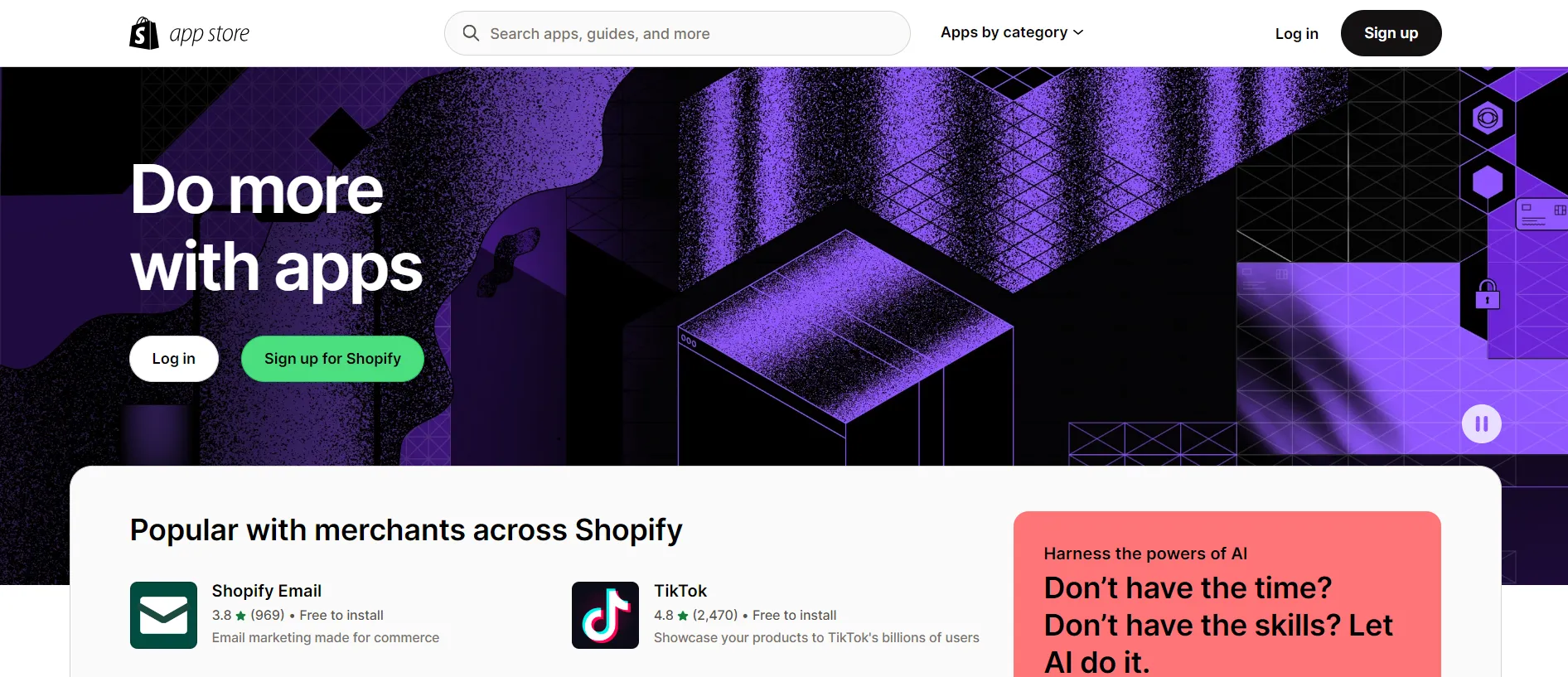
Adding to that, you can easily navigate to choose the trending apps, new and noteworthy apps, top new apps, and the like. Another approach is to explore the categories for more shipping and delivery apps, customization tools, or marketing features. Pick out the best Shopify apps for your store now.
In addition to the basic plans, Shopify developed Shopify Plus for stores that aim to go global. It offers advanced functionalities and tools that surpass those available on the standard Shopify platform. These include capabilities like multi-channel selling, global expansion, and advanced security measures.
The Verdict
From my point of view, Shopify is significantly more favorable for sellers or those who want to scale up their business. t offers limitless possibilities to build, innovate, and grow, thanks to the flexibility and convenience of an open SaaS platform.
5. Payment gateways – BigCommerce wins
When we compare Shopify and BigCommerce, it is evident that both platforms can integrate with almost all third-party gateways like Paypal, Stripe, Square, etc. However, what makes the difference between Shopify vs BigCommerce is that Shopify comes with its own built-in payment processor. Meanwhile, BigCommerce enables sellers to integrate third-party apps with extra good features.
Shopify payments
For your information, Shopify Payments is the in-house payment provider dedicated to sellers on Shopify. Whenever a purchase is made, Shopify Payment takes customers' money and directly sends it to store owners. Besides, it is packed with a fraud analysis to detect any suspicious activities.

Shopify Payments ensures a quick, smooth, and secure transaction between buyers vs sellers on Shopify. In addition, there are some advantages of Shopify Payment that truly impressed me:
- Instant setup and approval.
- Full integration.
- No extra transaction fees and hidden fees.
Apart from Shopify Payments, Shopify still provides support for 100+ third-party payment gateways based on your store location. However, a transaction fee ranging from 0.5% to 2% is applicable based on your monthly plan. This transaction fee only decreases if you choose higher-tier plans on Shopify.
BigCommerce payments
In comparison to Shopify, BigCommerce offers 65+ payment gateway integrations (plus 250 local payment methods) in over 100+ countries. Some cases in point are Amazon Pay, Paypal, Square, Stripe, Authorize.net, Bolt, etc. All come with excellent features as well, such as:
- No BigCommerce transaction fee for any third-party provider
- PCI Compliance.
- Mobile-optimized.
Another amazing addition to the BigCommerce portfolio is its multi-currency operation, which makes it a leading open SaaS platform. This feature allows you to use pricing lists to customize pricing at a deeper SKU level, something that other market leaders, even Shopify, do not allow.
Even better, BigCommerce users can select whichever payment provider they like. This design is distinct from other tools, which frequently force owners to use the in-built payment for multi-currency tools!
Below is our visualization answering the question, “How does BigCommerce work in terms of payment processing?”
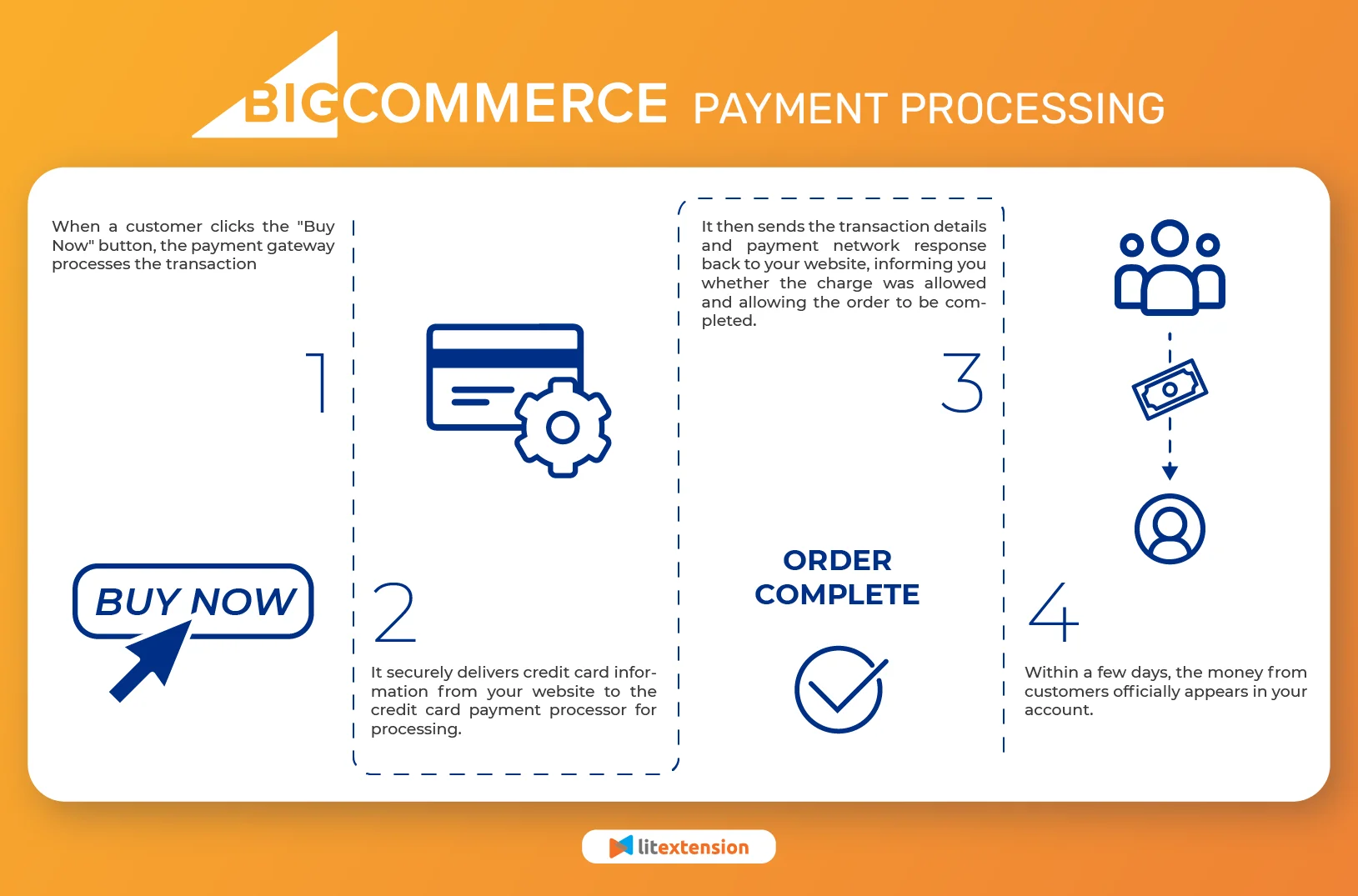
The Verdict
We have a soft spot for BigCommerce when it comes to payment gateways. The biggest reason behind this statement is that there's no transaction fee at all while still allowing connections to popular providers. It could save us – the online merchants – tons of money!
6. eCommerce dropshipping – Shopify wins
The most important thing for drop shippers is to be able to source products from suppliers quickly and easily. Only then can they add those products to their stores and have the selling and shipping process automated! That's why I decided to include this feature in my BigCommerce vs Shopify comparison. Although both apps let you do everything from start to finish, their quality slightly differs here.
Shopify dropshipping
As we perceive it, Shopify’s partnership with Dsers and Dropified is its headline feature for drop shippers.
Dsers is the go-to supplier for a massive selection of goods at wholesale prices. Even better, aside from Dsers, there are many similar apps available on the Shopify app market that focus on different niches, marketplaces, or regions. Thanks to Shopify’s high curation standards, they’re almost all highly rated and excellent at what they offer.
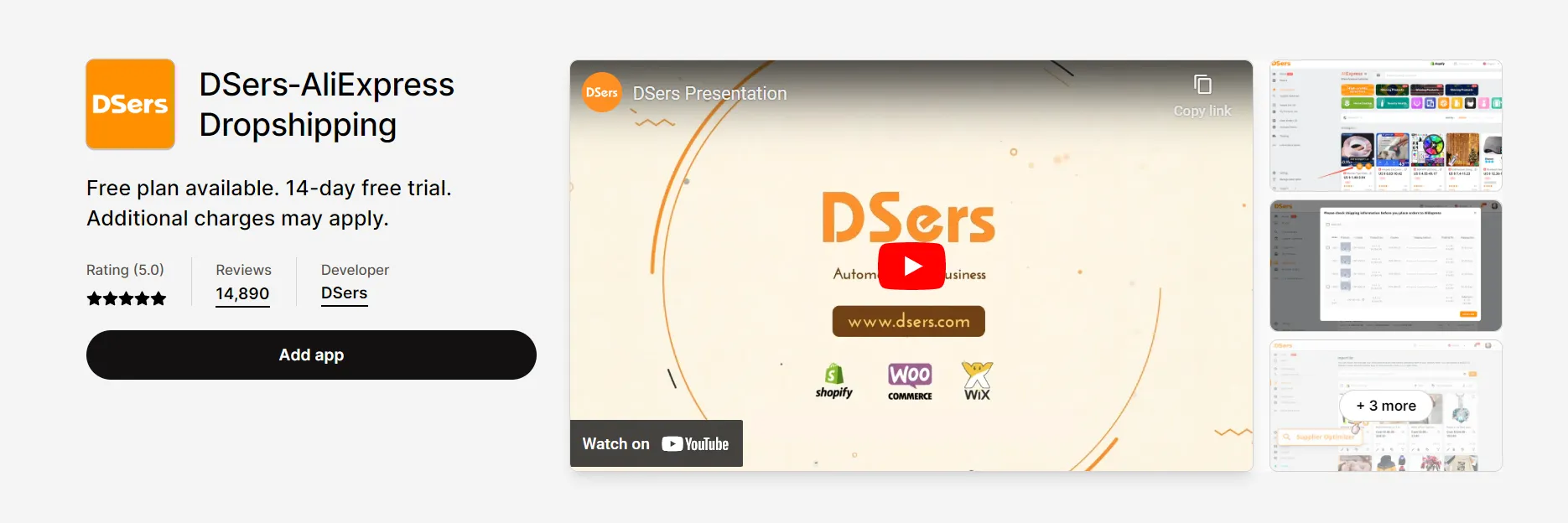
BigCommerce dropshipping
Like Shopify, BigCommerce also has a decent app marketplace with a number of great product-sourcing apps. However, the quality of BigCommerce’s other apps varies differently, and to be honest, a few of them are not as comprehensive as Dsers.
The Verdict
Shopify appears to offer slight advantages for dropshipping through its close supplier relationships and depth of specialized apps. Still, BigCommerce supports online merchants through many third-party integrations.
7. Sales features – A tie
Needless to say, sales features are a must for any online merchant; it is the deciding factor of whether you can generate higher sales with the platform. Fortunately, both BigCommerce vs Shopify have polished this aspect, yet we still have to dig deeper into the details.
Inventory management
BigCommerce: Offers a simple, native, and powerful inventory management system to manage stock levels and order trends. It helps keep inventory on track with seamless integration between online and offline channels. Furthermore, just the built-in BigCommerce features already allow us to sell physical, digital, and service-based products without using apps.
Shopify: Shopify's inventory area lets you set up inventory tracking, view your inventory, and adjust your inventory counts. It also helps view the history of inventory adjustments for product variants.
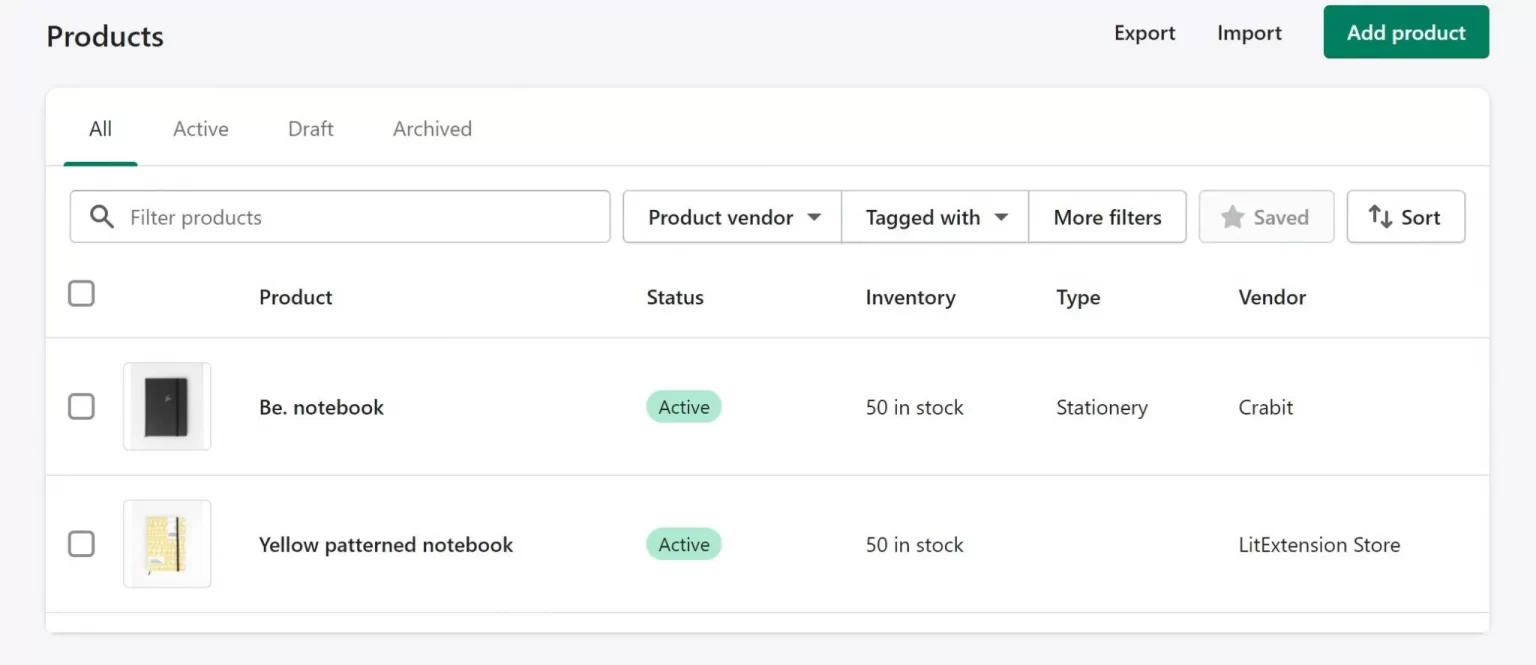
Sales channels
BigCommerce: Channel Manager is designed to help merchants grow sales while making multi-channel selling easier. I could easily connect my store with sales channels and sell on various marketplaces (eBay, Amazon, Walmart, etc.), social channels (i.e., Facebook, Google, etc.), and more.
Shopify: You can use Shopify to sell your products on different online sales channels. By connecting each sales channel to Shopify, we could keep track of the products, orders, and customers in one place. Plus, Shopify also supports several online sales channels such as Facebook, Amazon, eBay, Instagram, etc.
Point-of-sale (POS)
BigCommerce: Gives you the flexibility to connect with any POS providers (ConnectPOS, Hike, Vend, etc.) and consistently sell online and offline. It helps you manage product catalogs from one location and sync inventory everywhere. And none of this comes with additional fees!
Shopify POS: Provides an application on IOS and Android for a point-of-sale system directly available from Shopify. You can use this to sell your products in person. Kindly read this thorough analysis of Shopify POS to learn more about this feature!
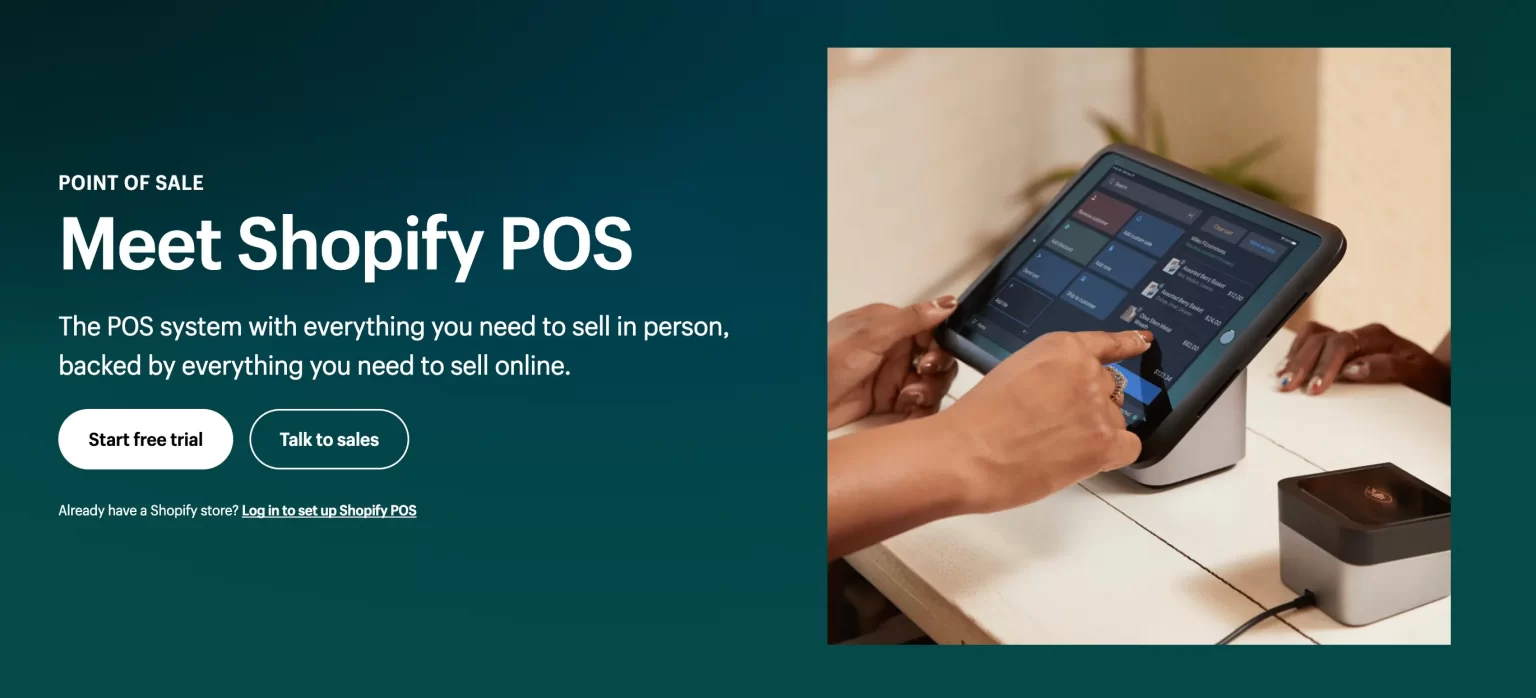
The Verdict
Both are good options. BigCommerce's natively integrated sales features across channels and POS systems may give it a small advantage for companies with complex omnichannel needs. Meanwhile, Shopify is highly capable of managing multi-channel sales and inventory.
8. Marketing features – Shopify wins
Marketing tools and functionalities come in handy when it comes to promoting your business! Let's move to BigCommerce vs Shopify's marketing features in this round.
BigCommerce marketing
Approaching customers through email marketing is a decent tactic to help promote products easily. Resultedly, BigCommerce allows you to sync data with leading email platforms: MailChimp, G Suite, and more.
Next, let's talk about BigCommerce vs Shopify SEO. From what I've observed, BigCommerce ensures industry-standard SEO, which is built into all of the BigCommerce sites. The best thing is that we had full control over URLs, title tags, header tags, and metadata. Moreover, 301 redirects in BigCommerce are automatically created whenever the name or the URL of a product, category, or web page is changed.
💡 We'd highly recommend integrating useful marketing applications to expand what you can achieve. For instance, connecting BigCommerce data to a platform like MailChimp allows for more flexible email design!
Shopify marketing
From our experience, Shopify email does a good job of providing you with built-in tools to build lasting customer relationships. This platform provides ready-made templates for you to choose from and apply right away. We are even able to manage and analyze all marketing activities within your dashboard.
And that's not all. Shopify’s SEO also supports on-page optimization with a custom title tag and meta description configuration. It is applied on an easy interface in every product and page editor. 301-redirect is easy to create as well within Shopify and automatically prompts if a page or product URL changes. You can discover more about it with the Shopify SEO checklist!
The Verdict
Both BigCommerce vs Shopify have a built-in blog, an essential yet very effective tool for content marketing. However, Shopify does offer more for merchants to optimize their sites in search engines.
9. Security – A tie
Ecommerce site security is critical, specifically when it comes to data protection and sensitivity on a website. Only when you set the right security measures for your website does it ensure customers’ privacy and integrity. Let's sê how BigCommerve vs Shopify stack up in this area.
BigCommerce security
It’s safe to say that BigCommerce leaves little to nothing to be desired in terms of its approach to security.
As a SaaS, BigCommerce provides multiple layers of strong security for all sites they host. All servers are PCI DSS certified at level 1 to protect against credit card data breaches. Additional security measures include perimeter and server-specific firewalls, file integrity scanners, intrusion detection software, 24/7 human monitoring, and fraudulent transaction protection.
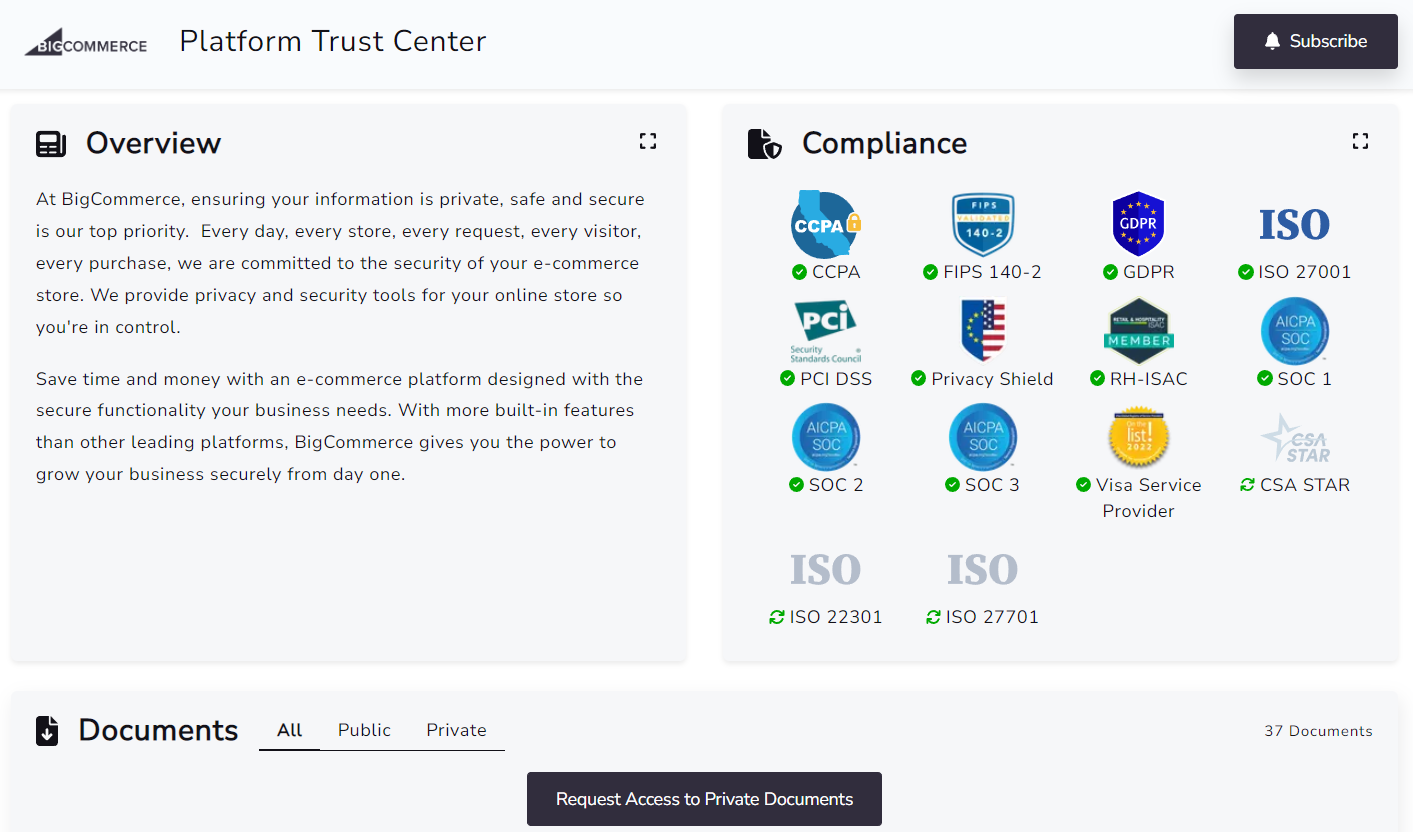
Additionally, you can use an SSL certificate issued by a trusted third party for a specific domain or subdomain. It verifies that a secure web page is properly encrypted, ensuring that all information passed between a user and the site is private.
Shopify security
Similarly, all of Shopify’s stores are PCI compliant by default to keep your business and customers secure. Thus, you can keep payment info and business data safe. Furthermore, Shopify provides SSL certificates after adding a custom domain. To improve security, SSL certificates encrypt your store’s content and publish it securely using HTTPS instead of HTTP.
The Verdict
In my opinion, BigCommerce and Shopify are comparable in terms of security. Both platforms take security seriously and provide multi-layered protection that should satisfy most small—to mid-sized eCommerce businesses.
10. Customer support – BigCommerce wins
If you want to get the most out of the eCommerce store-building experience, you need to look beyond pricing plans. Having access to tech support is crucial for any business. You never know what kind of problem you might run into.
Hence, in this section, let's take a look at how BigCommerce vs Shopify provides customer support.
BigCommerce support
I have had quite a good experience with BigCommerce support in the past few months, so I believe you will, too. Once you sign up for a BigCommerce free trial, you'll receive an appointment for a 10-minute call from this platform. By doing this, BigCommerce can understand more about your business and thus give better advice.
Besides, BigCommerce also gives top priority to those who enter the enterprise-level plan. You'll avail of onboarding consultants and phone calls from highly skillful BigCommerce staff.
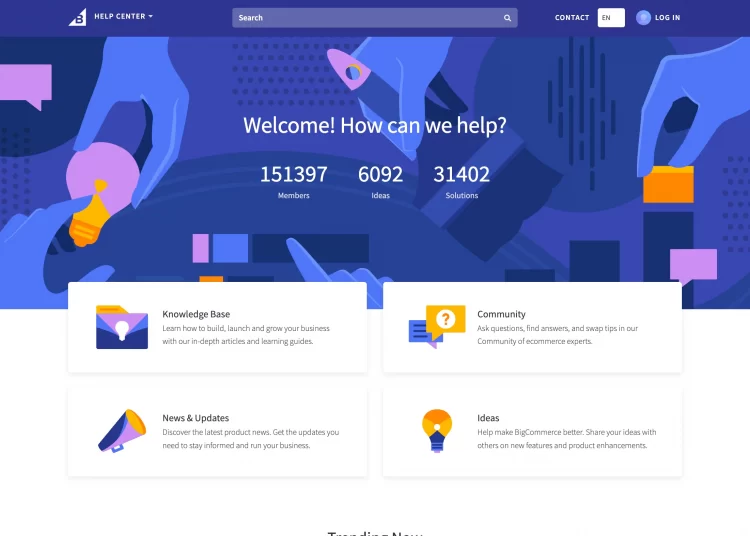
Shopify support
Like BigCommerce, Shopify also does a great job of separating detailed sections for customer support!
Plus, in addition to basic customer support like any other eCommerce platforms, Shopify customer service also offers support through social media. When you request help within the Shopify editor, it will direct you to a relevant page within the Shopify knowledge center. This is a great help feature and puts Shopify ahead of BigCommerce in this aspect.
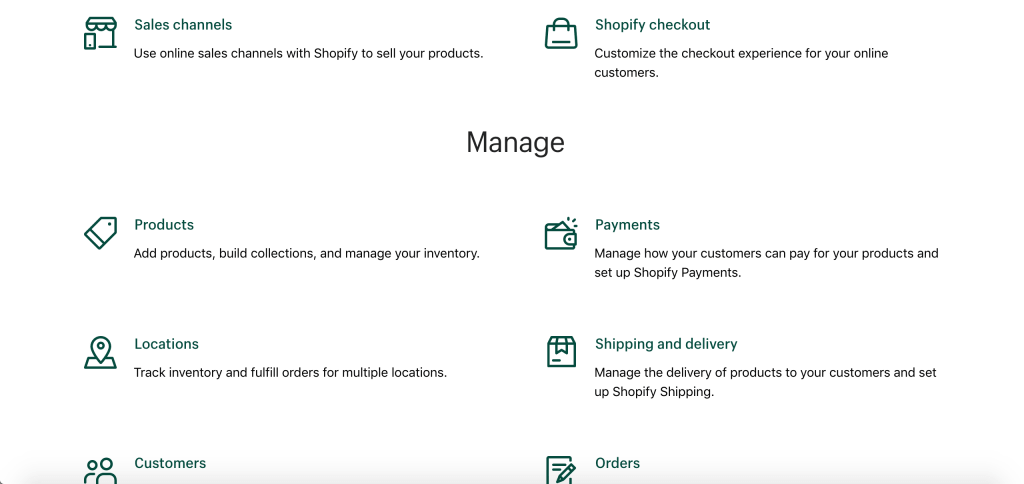
The Verdict
BigCommerce’s help center is useful but less clear than Shopify’s. A more streamlined help center organization and in-app guidance may give it a small advantage, making support issues easier to resolve for Shopify merchants.
Our Methodology
As mentioned above, it's not easy to evaluate which is better, Shopify vs BigCommerce. Therefore, I have spent over 3 months trying both platforms, carefully putting them to the test, and coming up with this comparison.
Here are my ranking criteria and weighing of each area based on their importance to our readers:
1. Sales and marketing features – 35%
In this criteria, I analyze each platform's built-in features to see how well it can assist merchants in selling online. Functions, like abandoned cart recovery, discount codes, and multi-channel selling capabilities, are put into consideration before I come to a conclusion.
2. Themes and customizability – 20%
I evaluate the selection of themes, their ease of use, and the level of customization offered. This helps determine which platform offers a more user-friendly experience for creating a unique and visually appealing online presence that aligns with your brand's identity.
3. Ease of use – 15%
I believe this is one of the critical factors when comparing BigCommerce vs Shopify because it directly impacts user experience, efficiency, and overall satisfaction. By evaluating this aspect, I want to make sure the platforms can cater to users of varying technical knowledge.
4. Apps and extensions – 10%
No matter how feature-rich a platform is, having a good collection of apps and extensions can certainly enhance a business's functionalities. Therefore, when choosing between BigCommerce or Shopify, I assess the available apps and extensions to evaluate the platform's extensibility and its ability to adapt to your specific business needs.
5. Security – 10%
A thorough examination of the platform's security features helps us ensure the platform can protect customers' private information. This includes evaluating data encryption standards, access control measures, and the platform's history of security breaches.
6. Customer support – 5%
A responsive customer support system is crucial for resolving user issues along their selling journey. That's why customer support is also a criterion that I adopt when comparing Shopify vs BigCommerce. This includes the availability of support channels (phone, email, live chat, etc.), the platform's knowledge base, and the expertise of their support team.
7. User review – 5%
I believe that no one understands a platform better than its users. As a result, when evaluating BigCommerce and Shopify, I also assess other customer reviews on external sources (like Capterra, Trustpilot, etc.) to see what merchants think of them.
Final Words
Both BigCommerce vs Shopify are excellent site builders on my list of best eCommerce platforms.
Although Shopify is the ultimate winner, your business direction is still what matters most here! If you want to save some money while still enjoying excellent built-in marketing features, BigCommerce is the go-to. For those who want easy, ultimate control over the store's themes and top-tier eCommerce functionalities, Shopify will be the best choice.
And if you are planning to migrate BigCommerce to Shopify, LitExtension – the #1 eCommerce Migration Expert team is willing to assist. Our team offers the world-leading migration solution with 300,000+ successful migrations for 200,000+ worldwide customers in the last 13 years. Don't hesitate to contact our support agents to get the utmost assistance.
Please visit LitExtension Blog and join our eCommerce community to grasp even more eCommerce insights.

